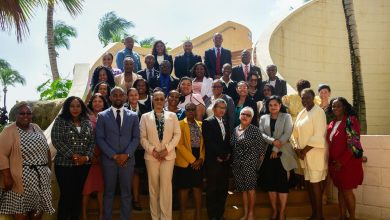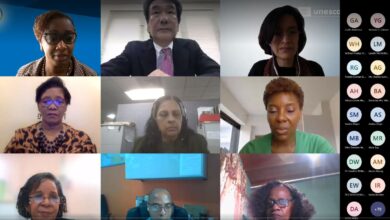(CARICOM Secretariat, Turkeyen, Greater Georgetown, Guyana) Ministers of Sport of the Caribbean Community (CARICOM) opened their Special Meeting on Tuesday with a chorus of calls for increased emphasis on physical activity, particularly in the Region’s schools.
The Ministers are in Georgetown, Guyana attending the two-day 17th Special Meeting of the Council for Human and Social Development (COHSOD) which is being held under the theme: Promoting Inclusion, Health, Education and Development through Sport.
Officials who addressed the opening ceremony also agreed that greater effort must be made to include the elderly and the differently abled in sports and physical activity.
The keynote speaker, Executive Member of the Caribbean Association of National Olympic Committees (CANOC), Mr Keith Joseph, pointed to the pivotal role of physical activity in social, economic, intellectual and cultural development and noted the nexus between sport and culture and our Caribbean values.
However, he lamented that very often our espoused values were not in sync with what we practiced, and pointed to the apparent lack of enthusiasm of educators, for sport and physical activity in developing the ideal Caribbean person.
Too often, he said, some schools administrators use physical education as a punishment, while others -even at the policymaking level – perceive it as frivolous.
“Our school principals and teachers cannot claim to be committed to education and deny children exposure to physical education. They cannot use the withdrawal of access to physical education sessions at school as a form of punishment for failure in academic work or for deviant behavior…” Mr Joseph said.
He urged Ministries of Education to “resist the temptation to characterise student and teacher involvement in physical activity as a loss of instructional time,” and argued that “nothing that engenders character building, improves capacity to produce and stimulate the mental faculties should ever be so erroneously characterised as loss of instructional time…”
Mr Joseph was scathing in his comments on how the Region treated the Differently-abled. In his opinion, the Caribbean had become so … “callous in its pursuit of development that we have not only ignored those who are challenged but also the older persons among us.
“We have very quickly adopted the production of Homes for the Elderly as a panacea for the aging crisis that looms and leave our people – our mothers and fathers and other family members – properly cloistered rather than offer them opportunities to live life to the full through physical activity in community,” he asserted.
In adding his voice, Guyana Minister of Culture, Youth and Sports, Honourable Dr Frank Anthony was adamant that despite the obvious value of physical education the Region had not taken it seriously.
He stated that if the values of physical fitness were not entrenched during the school years, the Caribbean would be facing an obesity epidemic. He added that the morbidity and mortality caused by obesity was already wreaking havoc on the Region’s health care systems. This, he said, called for bold steps in implementing a strong school based physical education programme across the Region.
“We need to have greater synergies between the governments of the region and the regional organizations that manage sports within the region,” he declared.
Minister Anthony recommended that an “Active People Survey” be done to benchmark the level of physical activity in the Region. This, he stated, was necessary for effective evaluation of any sport programmes implemented by CARICOM.
CARICOM Deputy Secretary-General, Ambassador Lolita Applewhaite weighed in with approval, noting that “it is critical to ensure that our people adopt active and healthy lifestyles across every stage of their life cycle.”
She pointed to reports that indicate increasing incidence of obesity and chronic lifestyle diseases among youth, and the increase in life expectancy across the Caribbean and further emphasised the need for greater attention to be paid to the management of seniors and persons with disabilities. “Provisions,” she added, “must be made for them to become and remain healthy and functioning members of society.”
Officer in charge of Human and Social Development in the CARICOM Secretariat, Myrna Bernard, in putting the meeting in context, explained that the theme of the meeting forced us to take stock on the role which sport could play in the core aspects of regional development.
She said that the Community’s effort to promote the value of sport and physical education in the development of human capital was well captured in the Vision of the Ideal Caribbean Person, endorsed at the Eighteenth Meeting of the Conference of CARICOM Heads of Government.
Ms Bernard told the Meeting that it was not only necessary to engage all key stakeholders in promoting physical education but it was also an imperative to provide appropriate levels of training for teacher educators and teachers in order to reorient the perspectives of school administrators, teachers, parents and communities on physical education.
The time had come, she said, for the COHSOD to “examine our strategies and policies in relation to the social and economic development of our region through sport …”





